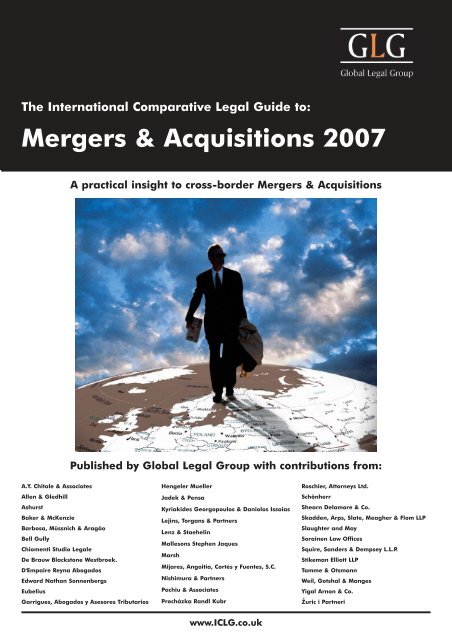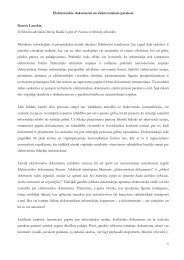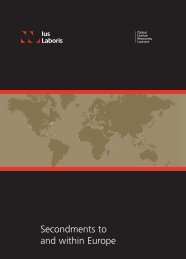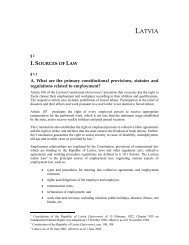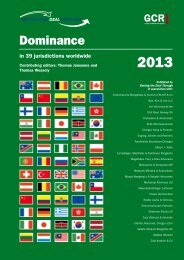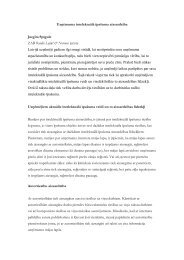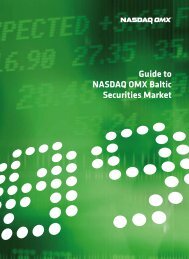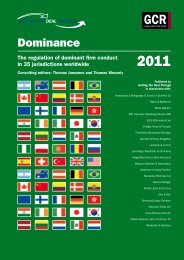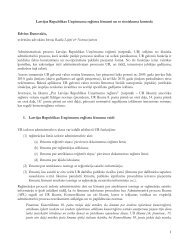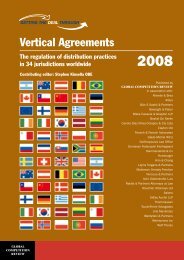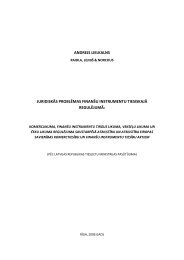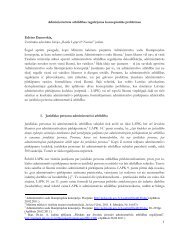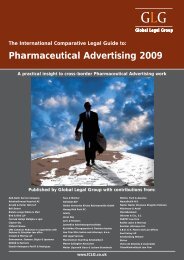Mergers & Acquisitions 2007. Latvia chapter - Raidla Lejins & Norcous
Mergers & Acquisitions 2007. Latvia chapter - Raidla Lejins & Norcous
Mergers & Acquisitions 2007. Latvia chapter - Raidla Lejins & Norcous
Create successful ePaper yourself
Turn your PDF publications into a flip-book with our unique Google optimized e-Paper software.
The International Comparative Legal Guide to:<br />
<strong>Mergers</strong> & <strong>Acquisitions</strong> 2007<br />
A practical insight to cross-border <strong>Mergers</strong> & <strong>Acquisitions</strong><br />
Published by Global Legal Group with contributions from:<br />
A.Y. Chitale & Associates<br />
Allen & Gledhill<br />
Ashurst<br />
Baker & McKenzie<br />
Barbosa, Müssnich & Aragão<br />
Bell Gully<br />
Chiomenti Studio Legale<br />
De Brauw Blackstone Westbroek.<br />
D'Empaire Reyna Abogados<br />
Edward Nathan Sonnenbergs<br />
Eubelius<br />
Garrigues, Abogados y Asesores Tributarios<br />
Hengeler Mueller<br />
Jadek & Pensa<br />
Kyriakides Georgopoulos & Daniolos Issaias<br />
<strong>Lejins</strong>, Torgans & Partners<br />
Lenz & Staehelin<br />
Mallesons Stephen Jaques<br />
Marsh<br />
Mijares, Angoitia, Cortés y Fuentes, S.C.<br />
Nishimura & Partners<br />
Pachiu & Associates<br />
Procházka Randl Kubr<br />
Roschier, Attorneys Ltd.<br />
Schönherr<br />
Shearn Delamore & Co.<br />
Skadden, Arps, Slate, Meagher & Flom LLP<br />
Slaughter and May<br />
Sorainen Law Offices<br />
Squire, Sanders & Dempsey L.L.P.<br />
Stikeman Elliott LLP<br />
Tamme & Otsmann<br />
Weil, Gotshal & Manges<br />
Yigal Arnon & Co.<br />
v<br />
Zuric i Partneri<br />
www.ICLG.co.uk
Chapter 20<br />
<strong>Latvia</strong><br />
Guntars Zile<br />
<strong>Lejins</strong>, Torgans & Partners<br />
Dace Silava-Tomsone<br />
1 Relevant Authorities and Legislation<br />
1.1 What regulates M&A<br />
The public stock exchange market in <strong>Latvia</strong> is rather<br />
underdeveloped and a considerably small number of companies<br />
have decided to become publicly traded (currently around 40).<br />
Therefore, the major part of M&A transactions in <strong>Latvia</strong> take place<br />
as private acquisitions, and public takeover transactions are almost<br />
non-existent (due to the comparably small public shareholder base<br />
of such publicly traded companies). Most public companies are<br />
companies which were “forced” to become public by means of and<br />
through the privatisation procedure. Thus far, public takeover<br />
mechanisms like voluntary share buy-out offers have been used by<br />
market players primarily to increase their existing shareholding and<br />
to decrease/eliminate the minority shareholder base.<br />
Private acquisitions are primarily regulated by the Commercial Law<br />
(Komerclikums) and Group of Companies Law (Koncernu likums).<br />
The public takeover process is primarily regulated by the Financial<br />
Instruments Market Law (Finanšu instrumentu tirgus likums),<br />
Finance and Capital Market Commission Law (Finansu un kapitala<br />
tirgus komisijas likums) and the Commercial Law. More detailed<br />
provisions regarding the public takeover process can be found in the<br />
regulations of the Finance and Capital Market Commission<br />
(Finanšu un kapitala tirgus komisija) (“FCMC”), the regulations of<br />
the Riga Stock Exchange (Rigas Fondu bira) and the regulations<br />
of the <strong>Latvia</strong>n Central Depository (Centralais depozitarijs).<br />
Companies and Their Supervision Law (Apdrošinašanas sabiedribu<br />
un to uzraudzibas likums), etc.). Specific rules apply in regulated<br />
sectors like financial institutions and insurance companies, setting<br />
forth special thresholds and criteria for the determination of<br />
significant participation (which triggers the necessity to obtain<br />
approval from the FCMC), special qualifying criteria for the<br />
shareholders of such targets, etc.<br />
1.5 What are the principal sources of liability<br />
The Financial Instruments Market Law prohibits insider dealing, as<br />
well as market manipulations (including distribution of false or<br />
misleading information in relation to the target’s price). In the case<br />
of a breach, the FCMC may, inter alia, suspend trading with the<br />
target’s shares, suspend the operations of the financial instruments<br />
market participant for a term of up to 6 months, impose a penalty of<br />
up to 10,000 Lats, etc. The person liable for insider dealing or<br />
market manipulations can also become subject to civil liability - the<br />
investors may claim compensation of damages in civil proceedings<br />
under the Financial Instruments Market Law and the Civil Law<br />
(Civillikums). In relation to the consequences of failure to comply<br />
with the notification requirements or requirements to make a<br />
mandatory share buy-out offer, see the answer in question 5.1<br />
below.<br />
2 Mechanics of Acquisition<br />
1.2 Are there different rules for different types of public<br />
company<br />
No legal distinction has been drawn and the rules do not differ<br />
depending on whether the company is/has been traded in <strong>Latvia</strong> or<br />
outside <strong>Latvia</strong>.<br />
1.3 Are there special rules for foreign buyers<br />
There are no special rules or restrictions for foreign buyers.<br />
1.4 Are there any special sector-related rules<br />
Different rules may apply depending on the business sector in<br />
which the company is engaged; e.g. regulated market participants<br />
like credit institutions, insurance services providers, etc. will be<br />
subject to specific regulatory frameworks under the Credit<br />
Institutions Law (Kreditiestau likums) and the Insurance<br />
ICLG TO: MERGERS & ACQUISITIONS 2007<br />
© Published and reproduced with kind permission by Global Legal Group Ltd, London<br />
2.1 What alternative means of acquisition are there<br />
In some cases, the merger can be considered as an alternative to an<br />
acquisition. Thus far, however, there have been no cases of mergers<br />
with a <strong>Latvia</strong>n publicly traded company involved. The merger<br />
procedure is more complex and subject to high thresholds of<br />
shareholder consent (at least a ¾ majority vote is required).<br />
Minority shareholders voting against the merger shall be entitled to<br />
claim buy-out of their shares (to be requested within 2 months after<br />
the date of merger).<br />
2.2 What advisers do the parties need<br />
There are no established rules to follow. Normally, the bidder will<br />
act through its investment bankers/brokers. Depending on the<br />
scope of the transaction, external legal and financial advisers may<br />
also be involved.<br />
WWW.ICLG.CO.UK<br />
127
<strong>Lejins</strong>, Torgans & Partners<br />
<strong>Latvia</strong><br />
2.3 How long does it take<br />
2.7 Do the same terms have to be offered to all shareholders<br />
<strong>Latvia</strong><br />
The first stage is the preparation of the document package and<br />
application for approval of the voluntary buy-out offer with the<br />
FCMC. Formally, the FCMC has to provide its approval or<br />
rejection within 10 days after all the necessary documents are<br />
submitted by the potential offeror. In practice, the timing may vary<br />
depending on a variety of factors (like the scope of the planned<br />
takeover transaction, the target, the identity of the potential offeror,<br />
etc.).<br />
Within 5 business days after the receipt of FCMC approval, the<br />
offeror has to publish the offer in the Official Gazette “Latvijas<br />
Vestnesis”. The term of the offer can be determined as between 30<br />
and 70 days, at the discretion of the offeror. Share purchase<br />
transactions must be closed within 5 days from the expiry of the<br />
offer term.<br />
Important factors that may affect timing are clearance from the<br />
competition authorities (e.g., clearance from the <strong>Latvia</strong>n<br />
Competition Council may take up to 4 months), and receipt of<br />
approvals from the other (sector-specific) regulatory authorities, if<br />
any.<br />
2.4 What are the main hurdles<br />
The main hurdles are general approval by the FCMC and, where<br />
necessary, clearance by the competition authorities.<br />
2.5 How much flexibility is there over deal terms and price<br />
The law or regulations do not set forth any requirements regarding<br />
the minimum or maximum offer prices; therefore, this is fully at the<br />
discretion of the bidder.<br />
The principal requirements to be observed are as follows:<br />
the validity term of the offer may not be less than 30 days and<br />
may not exceed 70 days;<br />
the offeror must set forth either the maximum or minimum<br />
number of target shares which are subject to buy-out offer;<br />
and<br />
the minimum (qualifying) target of the voluntary share buyout<br />
offer must reach a 10% participation share in the target.<br />
Where the offeror sets forth the maximum number of target shares,<br />
and the number of shares offered for sale is higher than the<br />
maximum, the offeror shall buy the shares in proportion from all<br />
persons offering their shares for sale.<br />
Where the offeror indicates the minimum number of target shares<br />
which should be subject to a buy-out offer, it must be clarified<br />
whether the offer remains valid if the minimum threshold is not<br />
achieved. The offeror may only refuse to purchase the shares<br />
offered for sale if it has clearly indicated that the buy-out offer will<br />
become invalid if the minimum threshold is not reached.<br />
2.6 What differences are there between offering cash and<br />
other consideration<br />
The offeror has to offer equal terms for all target shareholders<br />
holding shares of the same category (i.e. terms can only be different<br />
in relation to different categories of shares).<br />
2.8 Are there any limits on agreeing terms with employees<br />
There are no specific statutory employee consultation and approval<br />
requirements applicable in the context of public takeover<br />
transactions. The offeror is required, inter alia, to describe in the<br />
offer prospectus its plans in relation to the employment matters of<br />
the target company (i.e. whether or not it plans to reduce the staff,<br />
what (if any) will be the potential consequences of the successful<br />
transaction on the employment in the target, etc.).<br />
2.9 What documentation is needed<br />
The person intending to make a voluntary share buy-out offer has to<br />
apply to the FCMC, submitting a respective application<br />
accompanied by the following documents:<br />
offer prospectus;<br />
copy of the offeror’s registration certificate (in the case of a<br />
legal entity - non-resident); and<br />
document(s) certifying sufficiency of funding for the offer<br />
(for example, a commitment letter issued by a credit<br />
institution or insurance company certifying the availability<br />
of funding necessary to comply with the offeror’s<br />
commitments against the target’s shareholders).<br />
The primary document is the offer prospectus containing the terms<br />
and conditions of the offer (term, price, procedure for acceptance of<br />
the offer, applicable law, etc.).<br />
2.10 Are there any special accounting procedures<br />
There are no particular financial disclosure and reporting<br />
procedures that should be complied with by the bidder to make a<br />
voluntary share buy-out offer.<br />
2.11 What are the key costs<br />
Generally, the key costs would be the consultants’/advisers’ fees.<br />
There are no material State duties or similar payments to the<br />
authorities to be made for the purposes of the share buy-out offer.<br />
2.12 What consents are needed<br />
The share buy-out offer can only be issued after the receipt of<br />
approval of the FCMC. If the transaction is subject to clearance by<br />
the competition authorities, the respective approval should be<br />
obtained from the <strong>Latvia</strong>n Competition Council prior to<br />
implementation and/or, where applicable, from competition<br />
authorities of other countries/EU authorities.<br />
128<br />
There are no major differences. If other financial instruments are<br />
offered as consideration additionally to the cash, the emission<br />
prospectus should contain the description of such financial<br />
instruments (e.g. bonds) and the respective transfer / exchange<br />
procedures.<br />
2.13 What levels of approval or acceptance are needed<br />
Generally, no statutory target shareholders’ approval or acceptance<br />
is required for an acquisition. A merger is subject to the approval<br />
of at least a ¾ majority of the target’s shares with voting rights<br />
represented at the meeting (unless the charter of the target company<br />
provides for a higher threshold, in which case such higher threshold<br />
WWW.ICLG.CO.UK<br />
ICLG TO: MERGERS & ACQUISITIONS 2007<br />
© Published and reproduced with kind permission by Global Legal Group Ltd, London
<strong>Lejins</strong>, Torgans & Partners<br />
<strong>Latvia</strong><br />
shall apply).<br />
2.14 When is the consideration settled<br />
As a general rule, the payment of consideration in relation to public<br />
emission shares takes place simultaneously with the transfer of<br />
shares. The same rule is respectively applied to the transfer of<br />
closed emission shares, to the effect that title to the shares passes<br />
from the seller to the purchaser by payment of consideration. The<br />
management board of the target makes the respective entry in the<br />
shareholders’ register on the basis of the documents certifying<br />
payment. Details of payment procedures shall be provided in the<br />
offer prospectus.<br />
3 Friendly or Hostile<br />
3.1 Is there a choice<br />
<strong>Latvia</strong>n law does not distinguish between friendly and hostile<br />
transactions. In both cases, the bidders will be subject to and will<br />
have to abide by the same regulatory framework.<br />
financial/business reports, information on any material<br />
events/circumstances affecting the target/its business, etc.).<br />
4.2 Is negotiation confidential<br />
The laws do not contain any specific guidelines as to the rights and<br />
responsibilities of the management board to engage in and conduct<br />
negotiations with the potential offeror/purchaser of the company’s<br />
shares. Whereas the board is subject to the general duty of care and<br />
the potential takeover may qualify as a material event affecting the<br />
interests of the target company and its shareholders, it can be<br />
expected that the board would elect to take a careful approach, i.e.<br />
it would not engage in any confidential negotiations regarding the<br />
potential takeover transaction.<br />
Generally, there are no restrictions regarding the negotiations with<br />
the shareholders of the target (provided that insider dealing rules are<br />
complied with), and, as a general rule, shareholders are not subject<br />
to mandatory disclosure requirements (unless the respective<br />
shareholder is a public company itself).<br />
4.3 What will become public<br />
<strong>Latvia</strong><br />
3.2 How relevant is the target board<br />
Formally, the target board’s opinion is not essential for making a<br />
successful buy-out offer; however, in practice its opinion and<br />
activities may to some extent influence the process and outcome of<br />
the planned transaction. Thus, the board is required to prepare and<br />
publish: its opinion on the offer (within 5 business days after the<br />
respective offer is announced); the estimate/evaluation of the offer<br />
(and its potential results) on the interests of the company (in<br />
particular - employment issues); as well as an opinion on the<br />
offeror’s strategic plans in relation to the target company and the<br />
effects of those plans on the company and employment issues. The<br />
board may summon an extraordinary shareholders’ meeting to<br />
decide on potential counter-measures; it may also (without<br />
summoning the general meeting) take actions to seek alternative<br />
offers. Apart from that, however, the board of the target is<br />
prohibited from any actions or omissions that may hinder the buyout<br />
offer process.<br />
3.3 Does the choice affect process<br />
There are no specific requirements regarding disclosure of<br />
information about prior negotiations or transfer of information<br />
between the bidder and the target.<br />
4.4 What if the information is wrong or changes<br />
<strong>Latvia</strong>n law does not provide for an option to cancel or otherwise<br />
invalidate the share buy-out offer on the basis of incomplete or false<br />
information on the target. The offeror may, however, apply to the<br />
FCMC with the request to cancel a buy-out offer on the basis of<br />
breaches of legal requirements/law or on the basis of circumstances<br />
out of the control of the offeror qualifying as force majeure (i.e. the<br />
share buy-out offer can be cancelled but only by the decision of the<br />
FCMC).<br />
In any case, such circumstances may serve as the basis for a civil<br />
liability claim for the compensation of damages.<br />
5 Stakebuilding<br />
5.1 Can shares be bought outside the offer process<br />
In practical terms, a hostile approach would result in potential<br />
counter-measures launched by the board/shareholders of the target<br />
(e.g., an alternative/competing offer) being more likely.<br />
4 Information<br />
4.1 What information is available to a buyer<br />
In the case of a public takeover, where no information is provided<br />
by the target, the scope of information would primarily be limited<br />
to “public information”, i.e. information required to be disclosed by<br />
the applicable laws (e.g. annual accounts of the company);<br />
information contained in public registries (Commercial Register of<br />
the Republic of <strong>Latvia</strong> containing all material corporate information<br />
on the company, the Land Register containing information on the<br />
real estate owned, etc.); and the information disclosed by the<br />
company to the market organiser in accordance with its respective<br />
regulations, and published by the market organiser (e.g. interim<br />
ICLG TO: MERGERS & ACQUISITIONS 2007<br />
© Published and reproduced with kind permission by Global Legal Group Ltd, London<br />
Shares can be bought outside the offer process. Generally, there are<br />
no limitations. However, upon reaching certain thresholds, the<br />
acquirer of shares becomes subject to certain statutory obligations:<br />
1) When the total amount of target shares, whether directly or<br />
indirectly acquired, reaches thresholds of 5%, 10%, 25%,<br />
50%, 75% or 95% of the total amount of shares with voting<br />
rights, the acquirer should within 5 business days notify the<br />
market organiser and the target’s management board. This<br />
requirement applies irrespective of whether the shares<br />
acquired are fully or partially public emission shares or<br />
closed emission shares. The market organiser immediately<br />
publishes such information on its Internet homepage. The<br />
Management Board of the target company, not later than<br />
within 7 business days after the receipt of notice, makes it<br />
publicly available in <strong>Latvia</strong> and in any other country where<br />
the target company’s shares are traded in such form that<br />
allows all shareholders of the company to obtain this<br />
information.<br />
WWW.ICLG.CO.UK 129
<strong>Lejins</strong>, Torgans & Partners<br />
<strong>Latvia</strong><br />
<strong>Latvia</strong><br />
130<br />
In some limited cases (e.g. if the disclosure of information<br />
would harm the interests of the general public, or if the<br />
disclosure would cause damage to the respective target<br />
company, or to third parties), the FCMC, on the basis of a<br />
motivated application by the target company, may release the<br />
company from the obligation to publish information on the<br />
changes in shareholding. Such exemption may be applied<br />
for only in cases where it would not result in misleading the<br />
actual or potential shareholders of the company on facts or<br />
circumstances which are material to the purposes of<br />
evaluation of shares of the target company.<br />
2) When the total amount of target shares, whether directly or<br />
indirectly acquired, exceeds 50% of the total amount of<br />
shares with voting rights, the acquirer (or acquirers<br />
collectively, if two or more persons are acting in concert)<br />
must issue to other shareholders of the target company a<br />
mandatory share buy-out offer. This requirement applies<br />
irrespective of whether the shares acquired are fully or<br />
partially public emission shares or closed emission shares.<br />
This requirement does not apply if the shares are acquired as<br />
a result of voluntary share buy-out offer.<br />
The mandatory share buy-out offer is subject to a regulated<br />
price. Namely, the price per share may not be lower than<br />
either of:<br />
the price at which the offeror has acquired the shares of the<br />
company (where the offeror has acquired shares at different<br />
prices, the highest price applied during the last 12 months<br />
prior to the date when the circumstances triggering offer<br />
have occurred, will be used);<br />
the average stock price during the last 12 months prior to the<br />
date when the circumstances triggering the offer have<br />
occurred, where it is determined based on the stock price in<br />
active market; or<br />
the value of the shares, determined by dividing the ‘clean net<br />
asset value’ of the company by the total number of shares<br />
issued. The ‘clean net asset value’ shall be determined<br />
through the deduction of the total net asset value of the<br />
company from the value of the shares and commitments.<br />
(For the purposes of this method, the data indicated in the last<br />
annual accounts of the company as approved by sworn<br />
auditor(s) and the shareholders’ meeting of the company<br />
shall be used. The last quarterly accounts shall be used<br />
instead of annual accounts if this would result in at least a<br />
10% higher price.)<br />
All the above methods must be used and the highest price<br />
shall apply. If the offeror, during the period between ‘the<br />
date when circumstances triggering offer’ and the last date of<br />
the offer term, enters into an agreement on the purchase of<br />
the company’s shares at a price higher than the offer price,<br />
the price used in such transaction becomes the price of the<br />
offer.<br />
After the closing of the mandatory offer procedure, during a<br />
period of 6 months the offeror may purchase the target<br />
company’s shares at a price higher than the price used in the<br />
mandatory offer only if the offeror compensates to all sellers<br />
within the mandatory buy-out process the difference between<br />
the new purchase price and the purchase price used in the<br />
mandatory offer.<br />
3) When the total amount of target shares, whether directly or<br />
indirectly acquired, reaches or exceeds 90% of the total<br />
amount of shares, each of the minority shareholders of the<br />
company may request that the majority shareholder purchase<br />
its shares at a price that is not lower than the price<br />
determined according to the methods used for the purposes<br />
of the mandatory share buy-out offer. Such request is<br />
binding for the majority shareholder.<br />
A person who fails to comply with the respective notification<br />
requirements and/or to issue a mandatory buy-out offer<br />
potentially faces the following negative consequences:<br />
such person is not entitled to exercise the voting rights<br />
attached to the shares which it owns, as well as indirectly<br />
acquired voting rights. The decisions of the shareholders’<br />
meeting taken in violation of the abovementioned principle,<br />
shall be considered invalid; and<br />
the FCMC is entitled to issue a warning or impose a penalty<br />
of up to 10,000 Lats.<br />
The latter applies also in the case of failure of the majority<br />
shareholder, who holds at least 90% of the total amount of<br />
the shares, to comply with the request of the minority<br />
shareholder to purchase its shares.<br />
5.2 What are the disclosure triggers<br />
The person extending a voluntary offer is subject to a general<br />
requirement to notify and publish results of the offer process. Thus,<br />
within 5 business days after the expiry of the offer term, it is<br />
required to:<br />
submit a detailed notice to the market organiser and to the<br />
management board of the target company; and<br />
publish a detailed announcement in the Official Gazette<br />
“Latvijas Vestnesis”.<br />
Any person acquiring at least 5%, 10%, 25%, 50%, 75% or 95% of<br />
the shares with voting rights is required to notify the market<br />
organiser and the management board of the target company (for<br />
details, see the answer in question 5.1 above).<br />
5.3 What are the limitations<br />
There are no limitations on the ability to accumulate shareholdings,<br />
outside the general (voluntary) bid process (provided the acquirer<br />
complies with the respective notification obligations and, where<br />
applicable, the requirement to issue a mandatory share buy-out<br />
offer).<br />
6 Deal Protection<br />
6.1 Are break fees available<br />
There are no rules specifically addressing availability of “break<br />
fees” or similar payments. Where any agreement is entered into<br />
(e.g. in the case of a merger process or in the case of any separate<br />
share purchase transaction), the principle of contractual freedom<br />
can be used to include such provisions.<br />
6.2 Can the target agree not to shop the company or its<br />
assets<br />
Under the <strong>Latvia</strong>n law, it is not possible to require the target<br />
company/its board not to seek alternative/competing offers. The<br />
management board is entitled to do so without approval of the<br />
shareholders’ meeting.<br />
WWW.ICLG.CO.UK<br />
ICLG TO: MERGERS & ACQUISITIONS 2007<br />
© Published and reproduced with kind permission by Global Legal Group Ltd, London
<strong>Lejins</strong>, Torgans & Partners<br />
<strong>Latvia</strong><br />
6.3 Can the target agree to issue shares or sell assets<br />
Decisions on the issue of shares under <strong>Latvia</strong>n law are within the<br />
competence of the general meeting rather the management board of<br />
the company (or target itself). As a general rule, the management<br />
and supervisory board members of the company are prohibited from<br />
any activities or omissions that may hinder the offer process;<br />
however, there is no such prohibition in relation to the decisions of<br />
the general meeting of shareholders of the target, except for the<br />
below.<br />
After the public announcement of the buy-out offer, the company<br />
may not issue new shares or convertible bonds which may result in<br />
a change in distribution of voting rights in the shareholders’<br />
meeting. The company also may not decide on the distribution of<br />
dividends, change the nominal value of shares or decide to merge or<br />
split share emissions of the target. These restrictions apply until the<br />
expiry of the offer term.<br />
their shares.<br />
The price is determined using the same methodology, as in the case<br />
of a mandatory share buy-out offer (see the answer in question 5.1<br />
above). If the bidder has reached the 95% threshold as a result of a<br />
voluntary share buy-out offer, it is entitled to make the final buy-out<br />
offer at the same price as determined in such voluntary buy-out<br />
offer.<br />
A final buy-out offer can be made within 3 months after the date<br />
upon which the bidder acquired at least 95% of the total number of<br />
shares with voting rights. As a precondition for such offer, the<br />
target must pass a decision to leave the regulated market.<br />
8 Target Defences<br />
8.1 Does the board of the target have to tell its shareholders if<br />
it gets an offer<br />
<strong>Latvia</strong><br />
6.4 What commitments are available to tie up a deal<br />
There are no specific rules established or specific legal instruments<br />
available.<br />
7 Bidder Protection<br />
7.1 What deal conditions are permitted<br />
<strong>Latvia</strong>n law does not provide for conditional buy-out offers, i.e. it<br />
is not expressly permitted to include in the offer any provisions<br />
other than those listed in the law (e.g. price, terms of the offer,<br />
payment/exchange procedures, procedure for acceptance of the<br />
offer, etc.).<br />
7.2 What control does the bidder have over the target during<br />
the process<br />
Unless the offeror has already some control over the target (as a<br />
shareholder or otherwise), there are no specific legal mechanisms to<br />
allow the offeror to exercise any control over the target before or<br />
during the offer process. The offeror has limited rights to change<br />
the offer (subject to the approval of the FCMC); for example, to<br />
extend the term of the offer, to increase the price, etc. to the extent<br />
that it does not harm the shareholders of the target who have already<br />
accepted the offer. The offeror may also request the FCMC to<br />
cancel the offer, provided it can demonstrate sufficient grounds (see<br />
the answer in question 4.4 above).<br />
7.3 When does control pass to the bidder<br />
The bidder can only exercise direct control over the target through<br />
the shares and respective voting rights in the shareholders’ meeting,<br />
i.e. the bidder can take effective control of the target at the earliest<br />
when the first shareholders’ meeting takes place, after the bidder<br />
has acquired a sufficient percentage of shares to exercise respective<br />
control.<br />
The law is not explicit in this respect. It is determined that the<br />
person intending to make a voluntary share buy-out offer has to<br />
notify the management board of the target as soon as the decision to<br />
extend an offer is passed. Details of the offer and offer prospectus<br />
should only be provided to the target after the bidder has received<br />
the approval of the FCMC. It is not specified whether the board<br />
should or should not disclose to its shareholders the offer and/or the<br />
public information received from the potential bidder, thus leaving<br />
this to the discretion of the target’s board. The management board<br />
is committed to prepare and publish its opinion on the offer after the<br />
offer is approved by the FCMC.<br />
8.2 What can the target do to resist change of control<br />
There are no explicit rules regulating available defences. As soon<br />
as the board receives information on the planned offer, the board is<br />
entitled to seek alternative offers upon its own initiative. Any other<br />
activities that may potentially upset the planned offer process or<br />
outcome are subject to the approval of the shareholders’ meeting.<br />
8.3 Is it a fair fight<br />
No specific legal framework has been established to address and<br />
regulate situations with a preferred bidder and a hostile bidder.<br />
9 Other Useful Facts<br />
9.1 What are the major influences on the success of an<br />
acquisition<br />
Currently there are no <strong>Latvia</strong>n-based public companies which have<br />
a large public shareholder base. Normally, there are one or several<br />
major shareholders which exercise control over the target. Thus,<br />
any takeover attempt aimed at obtaining control over the target will<br />
primarily depend on soliciting the majority shareholder(s) to sell<br />
their shares. Such sale-purchase transaction generally would be<br />
treated on an individual basis and not within the scope of a<br />
regulated buy-out offer.<br />
7.4 How can the bidder get 100% control<br />
When the bidder has acquired at least 95% of shares with voting<br />
rights, it is entitled to make a “final share buy-out offer”, i.e. to<br />
request the minority shareholders to sell their shares to the majority<br />
shareholder. In such case, other shareholders are obliged to sell<br />
9.2 What happens if it fails<br />
ICLG TO: MERGERS & ACQUISITIONS 2007<br />
© Published and reproduced with kind permission by Global Legal Group Ltd, London<br />
<strong>Latvia</strong>n law does not provide any specific adverse legal<br />
consequences for the bidder that fails at an attempted takeover.<br />
WWW.ICLG.CO.UK 131
<strong>Lejins</strong>, Torgans & Partners<br />
<strong>Latvia</strong><br />
Guntars Zile<br />
<strong>Lejins</strong>, Torgans & Partners<br />
Kr. Valdemara 20<br />
Riga, LV-1010<br />
<strong>Latvia</strong><br />
Dace Silava-Tomsone<br />
<strong>Lejins</strong>, Torgans & Partners<br />
Kr. Valdemara 20<br />
Riga, LV-1010<br />
<strong>Latvia</strong><br />
<strong>Latvia</strong><br />
Tel: +371 782 1525<br />
Fax: +371 782 1524<br />
Email: Guntars.Zile@lt-v.lv<br />
URL: www.lt-v.lv<br />
Senior Associate of <strong>Lejins</strong>, Torgans & Partners specialising in<br />
Commercial Law, Corporate Law, <strong>Mergers</strong> and <strong>Acquisitions</strong>, Real<br />
Estate and Construction, Product Liability.<br />
Admitted to the Bar in 1999.<br />
Languages: <strong>Latvia</strong>n, English, Russian.<br />
Tel: +371 782 1525<br />
Fax: +371 782 1524<br />
Email: Dace.Silava-Tomsone@lt-v.lv<br />
URL: www.lt-v.lv<br />
Partner in <strong>Lejins</strong>, Torgans & Partners specialising in M&A,<br />
Competition and Real Estate.<br />
Admitted to the Bar in 1994.<br />
Education: <strong>Latvia</strong> University (LL.B. 1994; LL.M. 1998); College of<br />
William & Mary Marshall-Wythe School of Law, U.S.A. (LL.M.<br />
1996).<br />
Internships and secondments with Carroll, Burdick & McDonough,<br />
San Francisco, U.S.A. (1993), LeClair, Ryan, Joynes, Epps &<br />
Framme, Richmond, U.S.A. (1995), McDermott, Will & Emery,<br />
Washington, D.C., U.S.A. (1995), Pinsent Curtis, Leeds, U.K.<br />
(1998).<br />
Languages: <strong>Latvia</strong>n, English, Russian.<br />
The law firm <strong>Lejins</strong>, Torgans & Partneri was founded in 1994. During its years of operation, the firm has grown into<br />
one of the leading <strong>Latvia</strong>n law firms with a wide and respectable client base and excellent reputation for quality services<br />
rendered.<br />
The practice of <strong>Lejins</strong>, Torgans & Partneri is diverse and comprehensive, covering virtually every area of business law.<br />
Major practice areas include corporate law, mergers and acquisitions, banking and finance, competition law,<br />
commercial law, real estate, tax, customs and trade, labour law, intellectual property and litigation/dispute resolution.<br />
The staff of the firm currently includes sixteen lawyers.<br />
<strong>Lejins</strong>, Torgans & Partneri is a part of Roschier<strong>Raidla</strong>, an integrated cross-border operation in the Baltic rim market<br />
offering joint services of international quality standard and access to networks of premier law firms worldwide. Our<br />
cooperation partners are Roschier, Helsinki, Finland & Stockholm, Sweden, <strong>Raidla</strong> & Partners, Tallinn, Estonia, and<br />
<strong>Norcous</strong> & Partners, Vilnius, Lithuania.<br />
132<br />
WWW.ICLG.CO.UK<br />
ICLG TO: MERGERS & ACQUISITIONS 2007<br />
© Published and reproduced with kind permission by Global Legal Group Ltd, London


